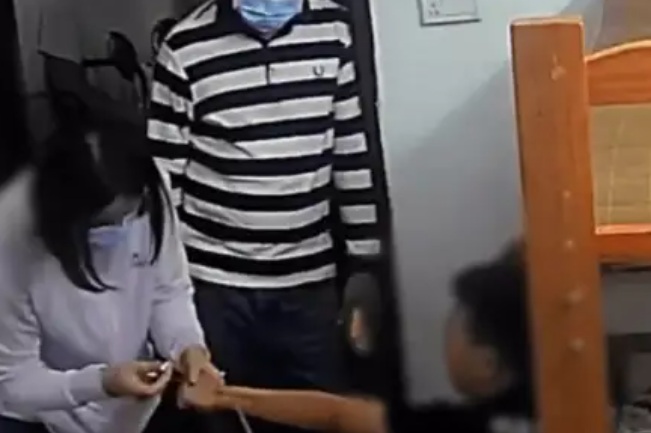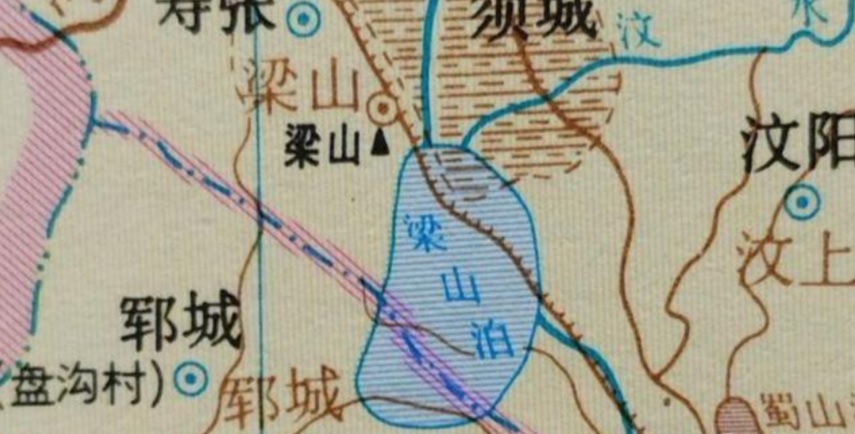The local response in Zhanjiang to “children’s blood drawn without parents at home at midnight” was based on superior requirements. What are the specific circumstances? Is this behavior legal and compliant?
On August 7, a netizen in Xiashan Village, Zhanjiang, Guangdong Province, posted a video claiming that a group of people, led by the landlord, entered her home at midnight to draw blood from her two children who were home alone, sparking attention.
Surveillance video footage shows a short-haired woman wearing a mask drawing blood from a boy and a girl inside the home, with four or five people standing at the room entrance, including uniformed police officers.
“Without the guardian present, do they have the right to draw blood from minor children?” The netizen stated that she is a single mother, raising her children alone while studying and working outside, taking care of the children during the day and working night shifts. She recalled that around 1:30 a.m. on August 4, the landlord led people to her home to draw blood from her two children without her consent. Her son and daughter were asleep and were suddenly woken up for blood drawing. “The people who came in weren’t wearing work uniforms or carrying IDs. When I returned home the next morning after work, I saw my two children crying at home, saying they were dizzy and scared.” She added that she wasn’t allowed to bring her phone to work, so she didn’t hear her daughter’s call. “But without her permission, can they just casually draw the children’s blood?”
In the comments section, some netizens questioned, “Who would come to draw blood at midnight?” while others advised her to call the police.
On August 7, Qilu Evening News · Qilu One Point reporters contacted the Xiashan Village Committee of Gongnong Street, Xiashan District, Zhanjiang City. Staff confirmed the incident, stating that recently, Xiashan Village had cases of chikungunya fever. According to local health commission requirements, pharmacies and clinics must report patients showing fever symptoms.
“Her son had a fever and went to a small clinic for treatment. The clinic reported the matter as required,” the staff said. That night, the health department received the information and found the parent’s phone number. They made many calls but couldn’t get through. As per regulations, it was necessary to quickly confirm if symptoms matched chikungunya fever and take certain measures. “Unable to find a solution, we sent police and doctors to confirm and had the landlord open the door to perform on-site blood drawing.”
Was it necessary to draw blood at midnight? Addressing this question, the staff explained the urgency of the current situation: “Relevant health experts have arrived, and the government has organized hundreds of people to come here for disinfection and investigation. Everyone is highly alert.”
Additionally, he further explained that currently, blood drawing is essential to accurately verify chikungunya fever. There are two scenarios for taking blood: one is when someone with fever symptoms buys medicine or visits a clinic, they will be notified that blood drawing is needed; the other is voluntary blood drawing by residents.
The staff admitted that all their actions were based on superior requirements, legal and compliant. At the time, they fulfilled their notification duty by making many calls that went unanswered, so the direct home visit for blood drawing was a last resort.
According to The Beijing News, on August 7, personnel from the local sub-district office stated that it was an urgent chikungunya situation requiring investigation. During the home visit on the evening of August 3, the children mentioned having a fever recently. Staff contacted the parent to discuss blood drawing, but the parent was uncooperative. Due to public safety concerns, they contacted the police for a joint operation. The parent involved claimed that days after the blood draw, the children still experienced dizziness and discomfort. Sub-district personnel said they had contacted pediatric doctors for home visits and communicated with the parent. Currently, the Health Bureau of Xiashan District has intervened.
According to a notice from the Health Bureau of Xiashan District, Zhanjiang City, four local chikungunya fever cases were detected in Gongnong Street from August 3 to 4. All four patients have received isolation treatment and are in stable condition.
On August 6, Zhanjiang City held a chikungunya fever epidemic prevention and control scheduling meeting, emphasizing that this is a critical period for epidemic control, compounded by high-temperature, humid weather conducive to mosquito breeding, making the epidemic prevention situation severe. Requirements were set for the entire city to strengthen key areas and targeted prevention measures to resolutely curb the spread of the epidemic.
Comment 1:
Even in criminal proceedings, if the suspect is a minor, questioning and trial of minors require the guardian to be present. “Criminal Procedure Law, Article 281: For juvenile criminal cases, during interrogation and trial, the legal representative of the juvenile suspect or defendant shall be notified to be present. If notification is impossible, the legal representative cannot be present, or the legal representative is an accomplice, representatives from other adult relatives, the school, workplace, local grassroots organization, or juvenile protection organization may also be notified to be present, with the situation documented accordingly. The legal representative present may exercise the litigation rights on behalf of the juvenile suspect or defendant.”
Comment 2:
Acting based on superior requirements does not equate to being legal and compliant. This incident is essentially a conflict between public health safety and individual rights protection. The official response repeatedly emphasized “relevant health experts have arrived, and the government has organized hundreds of people to come here for disinfection and investigation,” highlighting the urgency and suddenness of the event to justify the actions as legal and reasonable. Authorities’ power to take emergency measures in public health incidents stems from legal authorization, where administrative law enforcement follows the principle of “no action without legal authorization.” However, even when public safety is involved, it does not imply unlimited authorization. Although laws like the “Infectious Disease Prevention Law” and “Emergency Regulations for Public Health Emergencies” grant relevant departments the right to take necessary emergency measures during outbreaks, specific implementation must adhere to principles of necessity, proportionality, and procedural justice. Was it necessary to knock on doors at midnight, wake sleeping children, and draw blood without parents? Was there proven urgency requiring immediate testing at midnight? For instance, was there evidence that these children were high-risk close contacts about to cause mass transmission? Could routine daytime notification for parental-accompanied testing not achieve prevention goals? Did the timing (midnight), environment (without guardians), and method (invasive medical procedure) cause excessive psychological harm to minors compared to the public interest gained from prevention? Were there alternative investigation plans more protective of minors’ mental and physical health? These questions need consideration. We understand the need for departments to perform their duties and prioritize public safety, but enforcement within authorized limits could have been handled better than just mechanically executing superior orders. After all, raising the gun muzzle an inch can balance orders with conscience.
Comment 3:
【”Children’s blood drawn without parents at home at midnight” based on superior requirements】At first glance, this incident immediately brought to mind images of German Gestapo barging into homes or Soviet-era actions. Their reason was 【superior requirements】—I want to know, which level of 【superior】has such power? Is this superior the administrative department, legal department, or health commission department? Dare they, have the courage to say it? Such vague reasoning is absurdly stated with audacity. Parents not home, yet they barged in—like the wolf grandmother in fairy tales? Parental refusal to draw blood justifies breaking in? They might as well storm kindergartens or schools to forcibly draw blood. This behavior is terrifying, utterly unrestrained. What kind of national system gives these people the courage and audacity to do such things? I truly cannot find examples in civilized societies. Law and civilization are completely trampled. I assert that this so-called 【superior requirement】does not exist; it’s just an excuse to shift responsibility. 【The staff admitted that all their actions were based on superior requirements, legal and compliant, and they fulfilled notification duties with unanswered calls, making direct home blood drawing a last resort.】This is no justification—they could have set up an isolation zone and waited for the parent’s return as a better option. Drawing blood immediately is beastly, outrageous in a civilized society. With police involved, they could have found the mother’s workplace; if not possible, local police failed their duty. Clearly, these workers prioritized convenience, using violent, crude, law-trampling methods to complete tasks. In their eyes, social order doesn’t exist; with a command from 【superior】, they abandon all morality to execute orders—a horrifying phenomenon.
Comment 4:
A single mother with two kids in cheap rental housing, still at work at 1:30 a.m. without receiving messages—her job doesn’t allow phones. That’s only slightly better than a technical school restroom? They visit without offering birth subsidies or red envelopes, instead drawing blood from her kids alone? Putting this on an already stressed single mom? Scaring her children? How impressive.
Comment 5:
Epidemics aren’t magic doors allowing entry anywhere. Human dignity isn’t garbage to be trampled. The mother works nights for her kids, yet her children had blood drawn at midnight—how can she bear it? Children are a mother’s weakness and bottom line. If today you don’t stand with the weak, don’t speak for them, even think they’re overreacting—fine. But don’t think you’re safe; COVID-19 was just two years ago. When the nest is overturned, no egg survives; society without a bottom line harms everyone, including you.
Comment 6:
In Dongda (China), ordinary people’s “human rights” are very low; often, they’re sacrificed for grand narratives, framed as “for your own good!”
Comment 7:
What kind of world is this? Where’s science? Mosquito-spread, not human-transmitted—why torment people instead of killing mosquitoes? Especially children! Where’s the law? Police law, minor protection law, civil code… Who allowed entry? Who allowed needles to harm innocent kids? Where’s human rights? Treating mild cases as severe, overreacting, seeking relevance—utterly unscientific. What kind of world is this?
Comment 8:
As long as I think I’m doing good for you or the group, my power is unlimited. This isn’t rule of law or rule of man—it’s a livestock farm. Herding people.
Comment 9:
Chikungunya is mosquito-spread; testing isn’t urgent—midnight blood draws on kids unnecessary. But the incompetent leadership sees “infectious disease” and demands same-day testing. Even professional underlings won’t question orders, blindly executing, leading to absurdity. Like an apple orchard drought: reported, leader says “rest assured, we’ll water it today,” but afterward—who poured apple juice on the soil? The kids’ dizziness is likely psychological; parents shouldn’t overreact to avoid worsening symptoms. Besides blood drawing, another issue: the parent couldn’t receive calls as phones weren’t allowed at work. What secretive unit? Is that company rule legal? For single-parent families, what if it were an emergency needing parental consent? Could the child survive if unreachable?
Comment 10:
“The staff admitted that all their actions were based on superior requirements, legal and compliant.” Superior requirements, legal and compliant. “They fulfilled notification duties with unanswered calls, making direct home blood drawing a last resort.” Strangers can find license plates and addresses, yet community workers can’t locate a resident’s workplace or contact employers? If this is incompetence, their execution is strong; if it’s grassroots abuse of power, they claim superior orders and legality. Personally, I’m emotionally stable.





Heard some buzz about 88gobet8. Thinking of checking it out for some weekend fun. The layout looks promising. Thoughts? Join me 88gobet8, let’s have some fun!